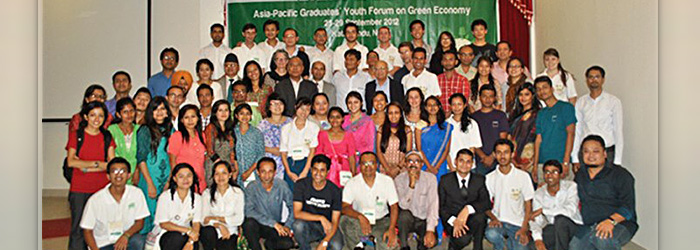Asian Pacific Graduates’ Youth Forum on Green Economy
25-29 September 2012 – Kathmandu, Nepal
Conference Website link
The Consortium for Capacity Building (CCB), Small Earth Nepal (SEN), and the Asia Pacific Mountain Network (APMN) of the International Centre for Integrated Mountain Development (ICIMOD) partnered in organizing the ‘Asia Pacific Graduates’ Youth Forum on Green Economy’ in Kathmandu, Nepal from 25-29 September 2012.
Funded under the CAPaBLE Program of the Asia-Pacific Network for Global Change Research (APN), this forum involved 40 youth who are engaged in sustainability issues from the wider Asia-Pacific region. The five-day program contained capacity building and knowledge exchange sessions, leadership exercises and excursions to nearby environmental projects.
The forum was also supported by the Government of Nepal, the Swiss Agency for Development Cooperation (SDC), the US Agency for International Development/Office of Foreign Disaster Assistance (USAID/OFDA), the Small Earth Australia (SEA) and the Centre for Hydrology at the University of Saskatchewan.
Workshop Objectives
- To develop the capacity of selected Asia-Pacific Youth on green economy, environmental governance and climate change adaptation>
- To facilitate information and knowledge sharing, networking and advocacy in the Asia-Pacific Region through the establishment of virtual and physical networks of dedicated youth.
- To improve participation of regional youth in the globally important meeting of UNFCCC COP-18.
GlobalGiving & East African Community Agriculture
CCB & Victory Gardens for Ethiopian Students
GlobalGiving is a charity fundraising web site that gives social entrepreneurs and non-profits from anywhere in the world a chance to raise the money that they need to improve their communities.
The Consortium for Capacity Building has organized an on-going project through GlobalGiving to train students annually in northern Ethiopia on harvesting water and growing fruits and vegetables in victory gardens for food and income. The idea is being disseminated to other villages through gardening clubs.
What is the issue, problem, or challenge?
The students in the village of Atebes near Adigrat, Ethiopia go hungry like peasant households. The village does not have fruits or vegetables due to water shortage and drought. Water and environmental degradation are the main problems in the village. The School in Mugulat does not have water and the kids have to carry water for them and their teachers. They also do not have school lunch or snack programs.
How will this project solve this problem?
Surface water harvesting will solve the impact of drought and the victory gardens will provide food to the students and families. The students will be trained by a gardening and design expert. Seeds and seedlings will be provided by the project.
Potential Long Term Impact
The victory garden model will spread to other villages through student victory garden clubs. Perennial fruit trees and vegetables will provide food for the households. The students will play a positive environmental citizenship role after they graduate.
International Graduate Conference
Climate Change & People
− Focus on Greater South Asia from Kyrgyzstan to Bangladesh
15-19 November 2010 – Kathmandu, Nepal
Conference link
The Consortium for Capacity Building (CCB), in conjunction with Small Earth Nepal (SEN) and the Asia Pacific Network Global Change Research (APN), organized and sponsored the ‘International Graduate Conference on Climate Change and People,” held in Kathmandu, Nepal from 15-19 November 2010.
As a regional-scale conference, its main focus was on scientific capacity building of the graduate and postgraduate students of different academic majors/disciplines through their knowledge- and experience-sharing with experts in climate affairs. Concerns about global warming and its impacts on people and ecosystems, as anticipated in Al Gore’s “An Inconvenient Truth,” remind us that the forthcoming generation of decision makers at government, education, industry and civil society levels need to be fully prepared to address climate-sensitive human activities and ecological processes. Targeting postgraduates (mainly master/doctoral students) in Greater South Asia, this conference aimed to develop students in the region as climate leaders and climate agents in their respective fields of endeavor.
Climate Change Impacts
Adaptations & Development in Mountain Regions
9-11 November, 2011 – Dushanbe, Tajikistan
Conference Document – Download PDF
